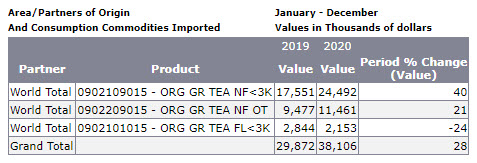The Organic Trade Association reports that US sales of organic food and beverages set a record in 2020, growing 12.4% to $62 billion. The total includes organic food, which grew by 12.8% to $56.4 billion. Import values for green tea also spiked, increasing 28% compared to 2019. Organic certified foods now account for almost 6% of total US food sales.

Green Tea Import Values Jump as Much as 40%
The pandemic caused consumer dollars to shift almost overnight from restaurants and carry-out to groceries, with traditional staples and pantry and freezer items flying off the shelves, according to OTA, “the only thing that constrained growth in the organic food sector was supply.”
“Across all the organic categories, growth was limited by supply, causing producers, distributors, retailers and brands to wonder where numbers would have peaked if supply could have been met!” said Angela Jagiello, Director of OTA Education & Insights.
In 2020 the declared value of organic green tea, shipped in packages of less than three kilos, spiked 40% to $24.5 million. The declared value for organic green shipped in bulk increased 21% compared to 2019. The declared value of all categories of green tea, when combined, rose 28%, according to USDA, FAS data.
Organic green tea volume increased 11% to 2.1 million kilos. Sales of organic black tea in teabags grew 19% to 879,100 kilos.
Grocers benefited overall during the pandemic as food sales in restaurants declined. In almost every organic food aisle, demand jumped by near-record levels, according to OTA.
Organic’s reputation of being better for you and the planet positioned it for dramatic growth, according to the association. OTA’s annual survey, conducted January through March 2021, confirms the trend toward premium offerings and more practical comfort. Sales of frozen and canned fruits and vegetables grew by 28%. Fresh organic produce sales rose by nearly 11% $18.2 billion.
Pantry stocking was overwhelmingly the main growth driver in 2020. As bread making and cookie baking took kitchens across the country by storm, sales of organic flours and baked goods grew by 30%.
“Good, healthy food has never been more important, and consumers have increasingly sought out the Organic label. Organic purchases have skyrocketed as shoppers choose high-quality organic to feed and nourish their families,” said Laura Batcha, CEO and Executive Director of the Organic Trade Association.
“We’ve seen a great many changes during the pandemic, and some of them are here to stay,” said Batcha. “What’s come out of COVID is a renewed awareness of the importance of maintaining our health, and the important role of nutritious food. For more and more consumers, that means organic. We’ll be eating in restaurants again, but many of us will also be eating and cooking more at home. We’ll see more organic everywhere – in the stores and on our plates.”
Organic food sales are not expected to continue at 2020’s fast rate but it’s anticipated that the grocery channel will get a lasting lift from the pandemic for the foreseeable future as many consumers continue to cook more at home.
Learn more: Organic Trade Organization
Share this post with your colleagues.
Signup and receive Tea Biz weekly in your inbox.
Never Miss an Episode
Subscribe wherever you enjoy podcasts:




